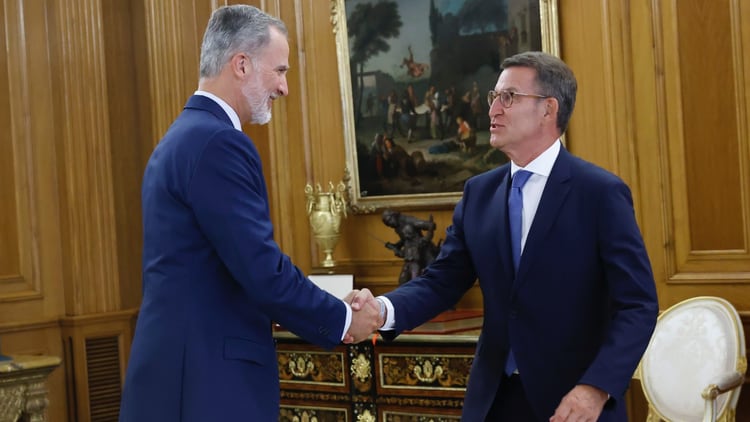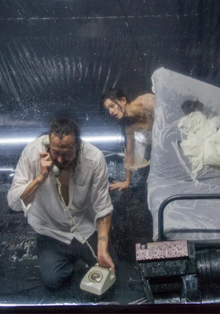The Diplomat
His Majesty the King decided yesterday to propose the President of the PP, Alberto Núñez Feijóo, for the investiture debate as President of the Government, following the round of consultations he held on Monday and Tuesday with the seven parties in Congress that wished to come to the Zarzuela Palace.
For the first time, the Head of State has faced the unprecedented situation of having two aspirants to be nominated: Alberto Núñez Feijóo, who won the 23 July elections and who has the committed support of 172 deputies from four parties (PP, Vox, CC and UPN), and the Socialist Pedro Sánchez, who sees himself capable of weaving alliances to achieve an absolute majority like the one that allowed him to control the Bureau of Congress a week ago. The secretary general of the PSOE, Pedro Sánchez, has 152 seats (PSOE and Sumar) and must sew pacts to achieve a majority.
The Monarch listened to the positions of UPN, Coalición Canaria, PNV, Sumar, Vox, PSOE and Partido Popular, but not those of Esquerra Republicana de Catalunya, Junts per Catalunya, EH Bildu and BNG, who decided not to attend, so they have not formally conveyed what their position will be.
After the round of consultations, yesterday afternoon, the King summoned the President of Congress, Francina Armengol, to the Zarzuela to inform her of his decision to propose Feijóo.
The Royal Household issued a statement detailing the reasons for Felipe VI’s decision: “The Partido Popular has been the political group that has obtained the largest number of seats in the last elections of 23 July. In this regard, it should be noted that, except in Legislature XI, in all the general elections held since the Constitution came into force, the candidate of the political group that has obtained the largest number of seats has been the first to be proposed by His Majesty the King as candidate for the Presidency of the Government. This practice has become customary over the years”.
In any case, Zarzuela stresses that, if Feijóo does not achieve a sufficient majority to be invested, as the positions expressed by the different parties suggest, “the King will process successive proposals in the manner provided for in article 99 of the Constitution” and, if none of them is successful, the Cortes will be dissolved within two months in order to call new elections.
Feijóo thanked the King for his appointment and wrote on his X account: “We will give a voice to the more than 11 million citizens who want change, stability and moderation with a government that defends the equality of all Spaniards”.
Armengol announced that she will contact Alberto Núñez Feijóo to find out his opinion and preferences for setting the date of the investiture debate. In any case, she understands that it is now time for him to start talks with other groups in search of support.
The PP leader has already stated that he considers it too soon to hold the investiture debate next week because he must first open a round of talks with the parliamentary groups, which will not be properly constituted until next Monday, when a meeting of the Congressional Bureau is scheduled to take place.
The investiture debate could therefore be held at the earliest by the end of August or the first week of September.
If the Congress of Deputies, by an absolute majority, grants its confidence to the proposed candidate, the King will appoint him president, a situation that seems complicated with Alberto Núñez Feijóo. If this is not the case, the same proposal must be put to a new vote 48 hours later, and confidence will be granted if the candidate obtains a simple majority.
If the investiture is achieved at the first attempt, the new president could take office on 8 September and immediately appoint his or her ministers. The Solemn Session of the Opening of the Legislature, presided over by the King, could be held in October.






